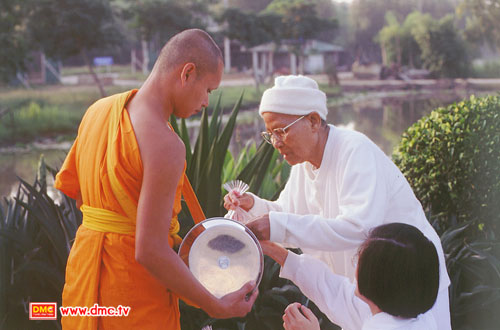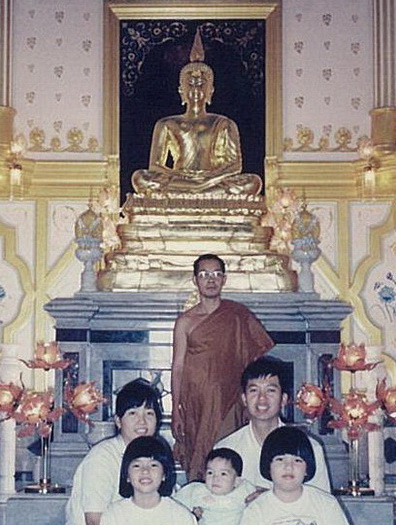Blessing Seven:
Artfulness in Knowledge
Artfulness in Knowledge

F. ILLUSTRATIVE EXAMPLES
F.1 Metaphor: Lamp lighting the path for a long journey ahead
Just as illumination is necessary to light the path ahead on a long journey, artfulness in knowledge is the pioneering virtue leading to prosperity in life.
F.2 Ex. Buddha advises a brahmin to pay respect to Ānanda (J.296)
There was once a brahmin who sought the advice of the Buddha. He said that it was obvious how one could pay respect to the Buddha and the Sangha, because they were already a sort of personality. However, the Brahmin didn’t know how to pay respect to the Dhamma which seemed more abstract. The Buddha replied that if you want to pay respect to the Dhamma, you should pay respect to those who are learned in the Dhamma. The Brahmin asked around to find which of the monks was the most learned and everyone agreed that
Ānanda was the most learned because more than any other monk, he had heard the teachings of the Lord Buddha. Thus the Brahmin went to pay respect to Ānanda above the other monks, many of whom had more advanced spiritual attainments.
F.3 Ex. Mahāsutasoma Jātaka (J.537)
There was a certain Buddha who while pursuing Perfections as the bodhisattva, was born as a king called Mahāsutasoma. The king was so keen to learn new teachings of the Dhamma that he would invite anyone who had knowledge of the Dhamma to come and teach him in the palace. On one occasion, Mahāsutasoma was captured by an ogre. The ogre was going to put him to death. On just the day the ogre was going to collect him, it was also the day when he had made an appointment with a knowledgable Brahmin Nanda to teach some teachings left over from the Kassapa Buddha. In that day and age, there were no living teachings to be followed any more. There were no monks left any more. Later even if the king offered the prize of a heap of gold as tall as the person to give the teaching, there would still be no-one who had any teaching to give the king. Even if the king offered the prize of a heap of diamonds as tall as an elephant, still nobody could be found to give a teaching to the teacher. However, in the time of king Mahāsutasoma, the decay of Buddhism was not so much that there were no teachings left any more. The day when the king was to be captured, someone had accepted an invitation to come and give a teaching in the palace. On that day, out of respect for the Dhamma, the king had first gone to freshen up and change into a new set of clothes in preparation for hearing the Dhamma. It was as he was washing that he was captured. The king made a deal with the ogre that it could do with him as it liked, but it should first let him listen to the teaching of the Dhamma, because he had already made an appointment with the teacher who was coming. The king promised the ogre that after hearing the teaching he would allow it to take him away for sacrifice. Even though the people of that time didn’t know about the Precepts, they still knew about the importance of truthfulness. The king was allowed to return to the palace where the Brahmin was waiting. The Brahmin didn’t even know how to explain the Dhamma, all he could do was to read out a piece of the scriptures. The Brahmin also had to wash himself before giving the teaching. He rinsed his hands with perfume before picking up the scriptures. He bowed three times to the scriptures and only then did he open up the scriptures in the most careful possible way. The subject matters of the scriptures were the words of a previous Buddha. The Brahmin could read the words and translate them, but he didn’t know the meaning:
Associating with the noble ones just once, one can be protected by that contact for the rest of one’s life.
However, associating with fools even many times, will fail to protect you for the rest of your life.
If you associate with the noble ones, you should associate with them closely, because anyone who can learn the virtues of a noble one will know only prosperity and never know decay.
Even a royal chariot that is beautifully decorated must eventually deteriorate and decay, In the same way the body that we possess must eventually decay and die.
However, the Virtue of the Noble Ones never goes out of date and never decays.
It is only the Noble Ones together who can know each others’ minds.
The earth and sky are far apart.
The two sides of the ocean are far apart.
But they are not so far apart, as the behaviour of the nobles and that of fools.
Before putting the scriptures away, the Brahmin bowed to them again. Hearing just these teachings, the king was so moved that he cried tears of joy. The king asked the brahmin, “Usually when you read this scripture to other kings, how much do they give you?”
The brahmin replied, “They give me a hundred for each verse.”
“These verses are not a ‘hundred a verse’ but are a ‘thousand a verse’” said the king, and presented the brahmin with five thousand.
The king remembered the appointment he had made with the ogre and thought to himself, “If I were to break my promise, it would only make my mind dull and guilty and I would certainly have an unfortunate afterlife destination — better that I go to my death with that ogre while my mind is still radiant from having heard the Dhamma.” The king gave himself up to the ogre. The ogre was surprised that the king didn’t show any sign of fearing death. It asked the king why he had no fear of death. When the king told them the Dhamma he had learned, the ogre was so impressed that it asked to take refuge in the king as its teacher and had no more thought about sacrificing him.
F.4 Ex. Tuccha-Poṭhila (The Blank Scripture Monk)(DhA.iii.417-21)
In the time of the Buddha there was an elder monk who was so learned in the Dhamma teachings that he had many disciples of his own. Many of his disciples had become arahants as the result of what he had taught — but he, himself, had not achieved anything. He had heard a lot of teachings but he had never showed any interest in practising for himself all the theory that he had taught. All he had was knowledge — he had no attainments.
Out of compassion, the Buddha wanted the elder monk to realize that he must practice for himself, so he always called the elder by the name ‘Blank Scripture’. If the elder came to see the Buddha, the only thing the Buddha would say to him was “‘Blank Scripture’— so you’re here again?” For other disciples the Buddha would ask questions or give encouragement, but instead of giving encouragement to this elder for having so many students he just said ‘Blank scripture’. Apart from this he would ignore the elder completely until everyone else was taking their leave. Again, the only thing the Buddha would say to him was “‘Blank Scripture’ — so it’s time for you to go?”
One day, the elder saw through his feeling of being slighted by the Buddha and thought to himself, “What the Buddha says is really true — I really am a ‘blank scripture’ — because I know all the scriptures by heart, but I have never used any of it in practice for my own benefit.” He thought to himself, “I have spent all my life teaching others, but I have never taught anything to the most stubborn person in the world — myself.”
(Sometimes, even though you know what is good and what is bad, you still don’t make any effort to change your behaviour. When the alarm clock rings in the morning, instead of getting up, you switch it off and go back to sleep. This is the reason why it is necessary to teach yourself regularly).
Thus the blank scripture elder went to the most senior arahant he knew and asked for his help in teaching the practice of Buddhism. The arahant, knew what was in the mind the elder and knew if he made life too easy for him, he would never give up the arrogance he needed to shed in order to learn anything. Thus the arahant did not agree to teach him, but sent him to a more junior arahant saying, “That monk is still young and healthy — he will have the strength to teach you what you want to know.”
The ‘blank scripture’ elder went to the younger arahant, but the younger arahant knew the character of the elder again. He knew with his seniority, the elder would not pay much attention to anything taught to him by someone half his age. Thus the young arahant sent the elder to study with a novice who was an arahant. The elder was tempted to give up his search for knowledge because of the humiliation of having to be taught by a young novice! However, the warning of the Buddha still rang in his ear and he gritted his teeth and went to see the novice.
The novice knew the arrogant character of the elder so he told him that to get a good result from the teaching, the elder must be up to his neck in river water to get any benefit. The elder thought, “I am really at my last resort — if I don’t do as this novice tells me, I will maybe never have the chance to learn any more.” When the elder was up to his waist in water, he had completely given up his dignity and hence his arrogance. The novice said, “Up to your waist is enough!”
The novice taught, “There is a termite mound with six entrances. A water monitor is inside the termite mound. The way to catch the water monitor is to block five entrances and to put your hand through the sixth and you will be able to catch the water monitor as you wish.” The novice didn’t need to say any more. Because the elder was an experienced teacher he immediately knew that the water monitor in the teaching is the mind itself which is constantly thinking of things that are of no benefit, losing its energy via the six sense doors. If we want to train the mind we have to control the five outer senses (eyes, ears, nose, tongue and body) and purify the sixth sense which is the object of the mind. As soon as the elder understood, he immediately trained himself in sensual restraint and purification of the mind.
By the end of the novice’s teaching, the elder was an arahant, even standing there up to his waist in water. Because the elder had been artful in knowledge for so long, to become artful in practice was no difficulty. All he needed was to have a little reminder to make him think a little. Thus we can see that to be artful in knowledge is essential for one’s personal development.










